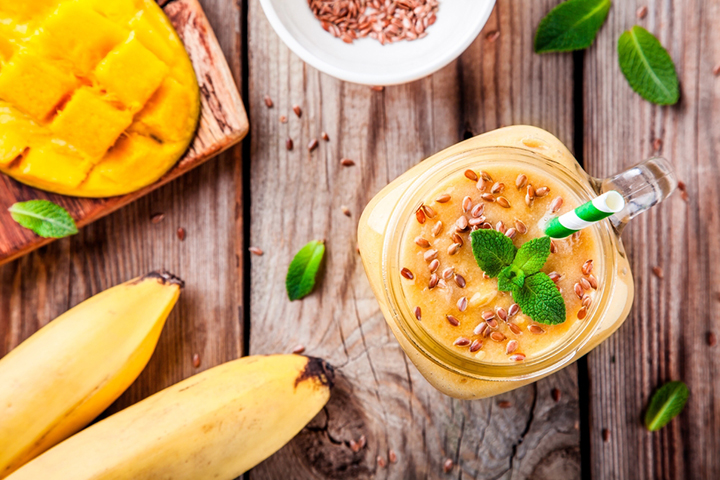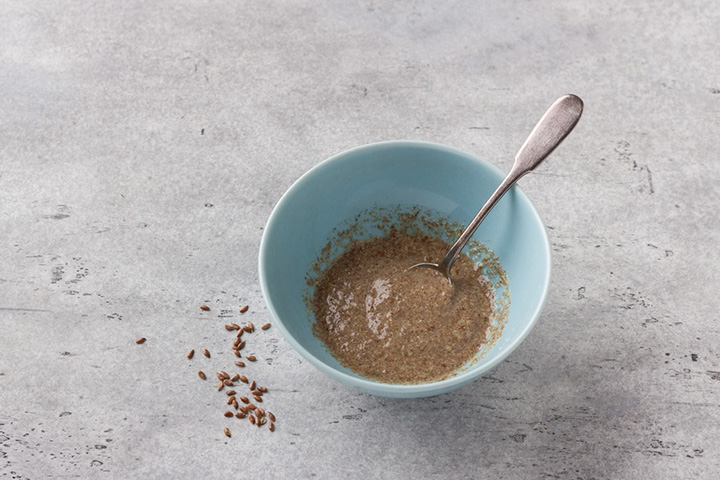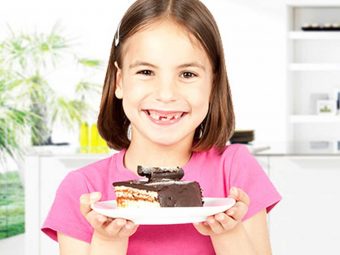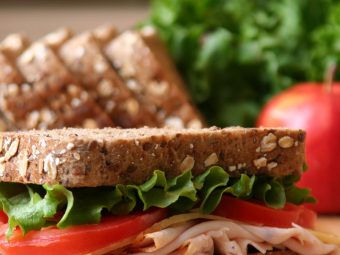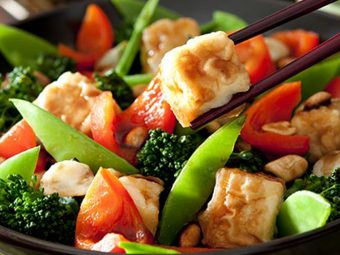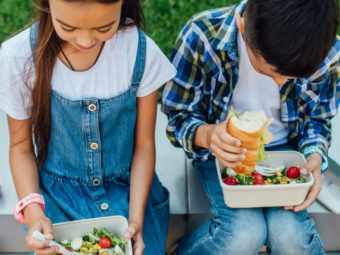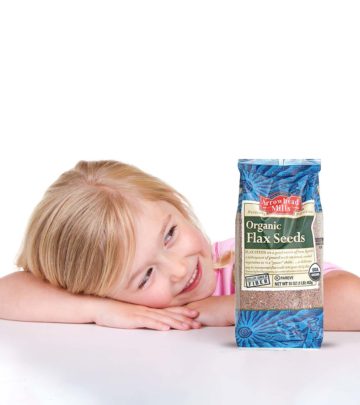
Image: Shutterstock
Flaxseeds are yet another food that falls under the category of superfoods. In this post, we highlight the benefits of flax seeds for kids.
You can start by introducing small amounts of flaxseeds into your child’s diet. But ensure not to give them too much at once because flaxseeds have laxative properties, and too much of it might cause problems to your child’s digestive system.
Read on to know more about the health benefits and side effects of flaxseeds for children and learn how to include them in your child’s diet.
Benefits Of Flaxseed For Kids
Studies conclude that flaxseeds have many health benefits for both children and adults.
- Flaxseeds are a rich source of certain compounds that stimulate omega-3 fatty acid production, which plays many important roles in strengthening the immune system and improving cardiovascular health. Its deficiency may lead to poor energy, fatigue, and lack of motivation (1).
- Flaxseeds are a rich source of protein and fiber, nutrients necessary for healthy digestion. Fibers help prevent constipation.
 Health fact
Health factImage: Shutterstock
- Flaxseeds provide the body alpha-linoleic acidiXA fatty acid found in plant-based foods (seeds and oils) that is crucial for optimal health. , a building block for omega-3 fatty acidsiXEssential dietary components that play a role in several body functions and benefit brain and heart health. . It helps improve brain function and development as well as the healthy development of eye tissues.
- Consuming flaxseeds can also reduce the production of inflammatory compounds and reduce the risk of conditions like rheumatoid arthritisiXA chronic inflammatory condition characterized by swelling, stiffness, and pain in the joints. , migraineiXA severe intermittent headache that can be triggered by certain factors and associated with other symptoms. , childhood asthma, etc.
- Flaxseeds also contain lignansiXPlant-based compounds found to be beneficial for human health. , also called as phytoestogens and antioxidants which help protect against many different forms of cancers (3).
- Flax seeds are also a rich source of minerals such as phosphorus, magnesium, and calcium (2).
Side Effects Of Flaxseed For Kids
While flaxseeds are one of the best foods to include in a diet, they have their fair share of certain side effects, and could prove to be harmful in certain cases.
- Flaxseeds tend to inhibit the body’s ability to absorb and break down certain medications or supplements, especially on oral consumption. It is important to avoid feeding your kid flaxseeds if he’s on certain medications or needs to take certain supplements.
- Flaxseeds also have moderate laxative action, and can lead to diarrhea if taken in large doses.
- Excessive gas and production of loose stools are a common side effect of consuming flaxseeds.
Image: Shutterstock
- Sometimes, your kid may develop an allergic reaction to flaxseeds. Unfortunately, no tests can help determine if your little one is allergic to flax seeds. If your child contracts rashes, itching, wheezing, etc., avoid feeding him flaxseeds.
- Flaxseeds can also make your child more susceptible to bruising, and can cause excessive bleeding. However, the risk of these occurrences is quite low.
Consult your pediatrician before you include flaxseeds in your kid’s diet. Pay extremely close attention to the dosage.
Tips To Include Flaxseed In Foods
Growing kids can be fussy about food and picky eaters as well. The availability of glitzy processed junk food only makes it worse. But, don’t lose hope! Here are some exciting recipes that will help you sneak in some much-needed flaxseed in your kid’s healthy snacks.
- Add a few ground flaxseeds to your kid’s smoothie– he won’t know the difference, and the smoothie will pack a healthy punch.
Image: Shutterstock
- Baking a cake or some cookies? Add some flaxseeds into the batter for a nutty and crunchy twist.
- Add some ground flaxseeds to condimentsiXFood additives that impart flavor and enhance the taste of a dish. and accompaniments such as ketchup, mayo, salsa dip, and mustard to make them healthier.
- You can also consider including flaxseeds in gravies, soups, and stews, and they’re so versatile that your kid won’t even know the difference.
An anonymous mother blogger shares how she smartly incorporates flax seeds into her unique Halloween cheese claws recipe to boost their nutritional value, “These Halloween cheese claws include 25g of flaxseed because it gives a mottled appearance to the biscuits and also provides a source of omega 3. You can buy ground flaxseed from health food shops, but if you can’t get your hands on some, you can also use extra plain flour instead (i).”
Steps To Make Flax Eggs For Kids
Image: Shutterstock
Eggs are essential for a child’s growth (4); however, if your child has an egg allergy or you follow a vegan diet, a flax egg can be an alternative to consider including in your child’s meals.
It is a 100% natural, vegan, and gluten-free product of ground flaxseeds and water. You can substitute eggs with a flax egg in your baking recipes.
- Flax egg recipe (equivalent to one egg) (5):
- In an empty bowl, pour 1tbsp (15ml) ground flax.
- Add 3tbsp (45ml) of warm water.
- Stir the mixture with a fork.
- The mixture thickens to form a flax egg. You can use it instead of an original egg.
 Quick tip
Quick tipFrequently Asked Questions
1. How much flaxseed should a child consume per day?
Children may consume about two tablespoons of flaxseeds a day (1). However, it is advisable to consult a pediatrician before giving flaxseeds to children.
2. What are the best ways to store flaxseeds for children?
Whole flaxseeds may be stored in a refrigerator for up to a year. Ground flaxseeds get easily oxidized and must be stored in an airtight container in the fridge (up to six months).
3. Are there any flaxseed supplements recommended for children?
Flaxseed oil is available in the form of supplements. However, no supplement should be given to children without the consent of a pediatrician.
4. How do flaxseeds compare to other sources of omega-3 fatty acids for children?
The three main omega-3 fatty acids are alpha-linolenic acid (ALA), eicosapentaenoic acid (EPA), and docosahexaenoic acid (DHA), of which ALA is an essential fatty acid (the body cannot produce it). One tablespoon of whole flaxseeds contains about 2.35g of ALA. One ounce of chia seeds and walnuts contain 5.06g and 5.27g ALA, respectively. Three ounces of fish, such as salmon, contain about 1.2g DHA and 0.5g EPA (7).
Flaxseeds for kids can improve their brain and eye growth and promote digestive health. However, you must give flax seeds in moderation due to their laxative properties, such as causing diarrhea. These seeds are high in omega-3 fatty acids, anti-inflammatory agents, and cancer-protective lignans. They also contribute to the daily fiber and protein requirements of a child. However, ensure that your child is not allergic to flax seeds by giving them smaller amounts at first. You may also add powdered flax seeds into sauces, gravies, bread, baking batters, or smoothies.
Infographic: Advantages Of Flaxseeds For Children
Flaxseeds are a great source of nutrition for children, either as a topping in yogurts or smoothies or as an ingredient of baked goods. They are packed with vital vitamins and minerals that support overall health and well-being. So, explore some of the benefits of flaxseeds for children in the infographic below.
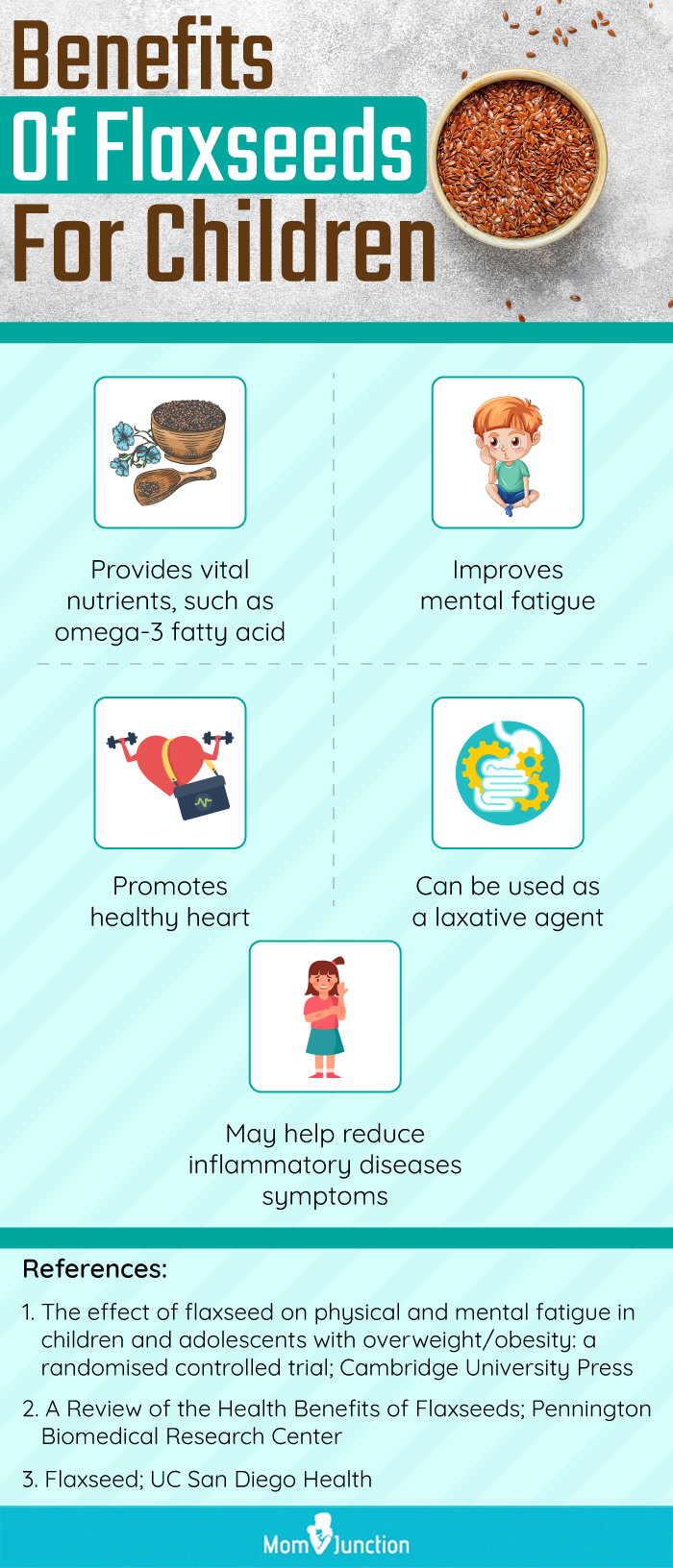
Illustration: Momjunction Design Team
Key Pointers
- Flaxseed consumption can enhance cognitive function and lower the chance of developing certain diseases.
- Consuming flaxseeds may result in allergic responses and profuse bleeding.
- Flaxseeds may not be a favourite food for kids, but can be added to smoothies, baked goods, sauces, and gravies.
- Flaxseeds should be introduced gradually and in moderation due to their laxative qualities; consult a doctor beforehand.
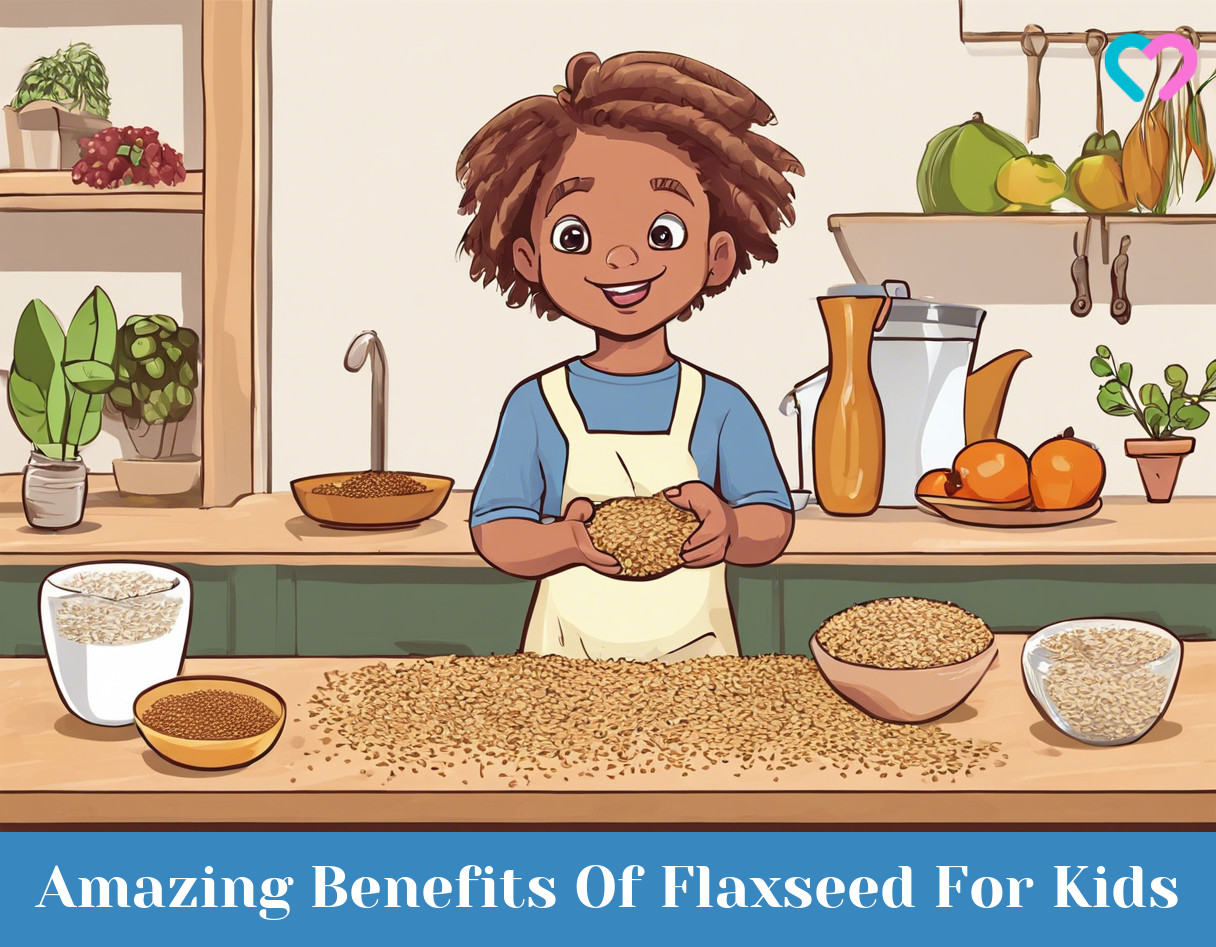
Image: Stable Diffusion/MomJunction Design Team
Personal Experience: Source
MomJunction articles include first-hand experiences to provide you with better insights through real-life narratives. Here are the sources of personal accounts referenced in this article.
i. Halloween cheese claws.https://broccoliandricecakes.wordpress.com/2015/10/28/halloween-cheese-claws/References
- Flaxseeds fish oils and neural development.
http://www.youandyourchildshealth.org/articles/flaxseed-fishoil.html - Flaxseed ground.
https://fdc.nal.usda.gov/fdc-app.html#/food-details/2262075/nutrients - Flax and flaxseed oil: an ancient medicine & modern functional food
https://www.ncbi.nlm.nih.gov/pmc/articles/PMC4152533/ - Eggs for Babies and Children.
https://www.australianeggs.org.au/nutrition/babies-and-children - How to make a Flax Egg?
https://www.healthyflax.org/quadrant/media/files/pdf/FLAX_EGG.pdf - LinYan; The benefits of flaxseed.
https://www.ars.usda.gov/plains-area/gfnd/gfhnrc/docs/news-articles/2012/the-benefits-of-flaxseed/ - Omega-3 Fatty Acids.
https://ods.od.nih.gov/factsheets/Omega3FattyAcids-HealthProfessional/







